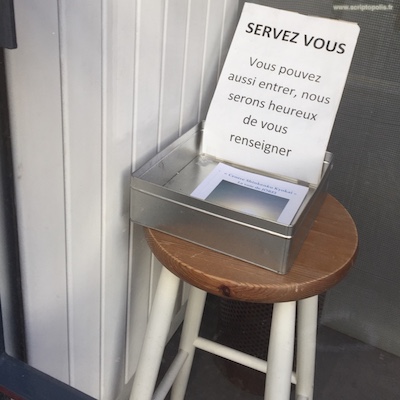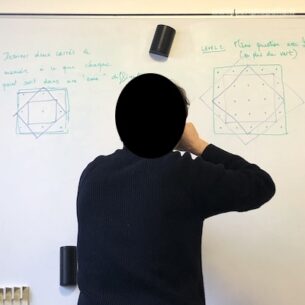Help yourselves

Paris, December 2017.
You’ve been walking past this glass door every day for years. The gilded brass plate shows a Japanese name, which you have already copied on your mobile phone to make a request. Then, you were looking for yoga classes, your attempts had been unsuccessful. You could discern exercise mats inside and see people early in the morning. They didn’t look like the newly vegan Yogi apprentices you’d frequented. You liked it. You wanted to try, but you couldn’t find anything on the Internet. The idea slipped out of your mind until this stool was installed on the other side of the glass door.
The “help yourself” sign caught your attention and revived your curiosity. You step forward to find out about the schedules, until the device reminded you: you have to go through the door to pick up a leaflet, information is visible outside, but not really self-service. Why didn’t they put the flyers right on the sidewalk? Why don’t they state what they want to say, yoga or something else, more clearly on the street? And above all, why do you find the words “we will be happy to inform you”, which initially sounded like a nice approach to you? Nevermind, you stick to the bold script, take a leaflet and turn your heels to walk away.
The strangeness of signage gives way to a misunderstanding of reading. You copy some of the keywords about energy transmission sessions on the internet. No site but here we are: it is the headquarters of a Buddhist sect, listed in a 1996 parliamentary report as a “sectarian movement of 50 to 500 followers”. Well, given the criteria defined by the general information to qualify as a “sect” any collective (including “more or less anti-social discourse, disturbances to public order and the importance of legal trouble”) and the fuzzy “cluster of clues” selected by the parliamentary committee, you do not give the report too much meaning. On the other hand, you thank Scriptopolis for maintaining your vigilance on the singularity of urban inscriptions and their setting.






